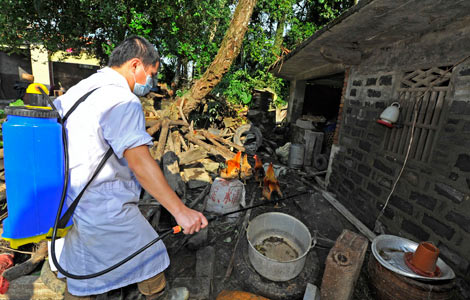Banks'nonperforming loans up slightly in Q3
Updated: 2013-11-14 00:05
By WU YIYAO in Shanghai (China Daily)
|
||||||||
Bad loans by China's lenders rose 24.1 billion yuan ($3.96 billion) in the third quarter, the biggest quarterly rise since the fourth quarter of 2005, according to data released Wednesday by the China Banking Regulatory Commission.
The ratio of nonperforming loans rose to 0.97 percent at the end of September from 0.96 percent at the end of June, the CBRC said.
Analysts said that despite the growth, the NPL ratio still is low, which doesn't put pressure on banks to raise new capital.
"Lenders now have more channels to manage their NPL risk than before, and with a lower-than-1-percent NPL ratio, the risks are well under control," said Wang Wei, an analyst with Hua Xia Securities.
High levels of loan loss reserves may provide a cushion for NPLs, and the NPL ratio is still under 1 percent, which is relatively safe, a note from Citic Securities Co Ltd said.
According to the CBRC, at the end of September, the LLR was about three times that of the NPL, and average core tier-one capital ratios rose slightly to 9.87 percent in the third quarter from 9.85 percent in the second quarter.
Chinese regulators have been encouraging banks to raise fresh capital in order to strengthen their ability to absorb bad loans.
Since 2010, policymakers also have eased rules for writing off debt to small businesses while requiring lenders to improve their risk buffers' capability.
In April, the CBRC urged lenders to set aside more funds in order to cover defaults, write off some bad loans and curb dividend payments while retaining earnings ample enough to create a cushion in case of an economic slowdown.
In October, regulators announced new rules allowing commercial banks to sell special loss-absorbing subordinate debt on the country's stock exchanges.
Also in October, China's third-largest lender Agricultural Bank of China Ltd announced it would be selling nonperforming assets valued at 10 billion yuan, including 19 properties used for loan repayment and seven loans, on the Beijing Financial Assets Exchange.
The biggest rise in bad loan ratios was at midsize banks, with the overall ratio rising from 0.80 percent in the second quarter to 0.83 percent in the third quarter, the CBRC said. China Merchants Bank Co Ltd, the country's sixth-largest lender, reported that its NPL ratio rose to 0.79 percent at the end of September from 0.71 percent at the end of June.
Rural commercial banks reported the highest NPL ratio among all lender categories, with a 1.62 percent NPL ratio and 65.6 billion yuan NPL balance.
State-owned lenders reported mild NPL changes in the third quarter. China Construction Bank Corp and Agricultural Bank of China reported smaller NPLs in the third quarter than in the second quarter. According to quarterly reports by the five biggest State-owned lenders, a combined 12.06 billion yuan in NPLs was added in the third quarter.
"Lenders will have no problem meeting Basel III [the third Basel Accord, a voluntary global stress-testing standard], and writing off the worst of the bad debts will allow lenders to mitigate the surging NPL ratios amid rising defaults in the nation," Christine Kuo, vice-president and senior credit officer of financial institutions group, Asia Pacific of Moody's Investors Service, said in a note.
According to several analysts, banks need to improve their risk management abilities amid the liberalizing of interest rates and increasingly fierce competition.
Commercial banks should pay attention to any inherent risks in wealth management products and off-balance-sheet business, they said.

 Graduation celebration for Santas
Graduation celebration for Santas
 One World Trade Center deemed tallest US skyscraper
One World Trade Center deemed tallest US skyscraper
 Xiamen Airlines gets milestone 100th Boeing
Xiamen Airlines gets milestone 100th Boeing
 PANDA! set to debut in Las Vegas
PANDA! set to debut in Las Vegas
 Lest we repeat the horrors of the past
Lest we repeat the horrors of the past
 Haiyan toll rises in Guangxi, Hainan
Haiyan toll rises in Guangxi, Hainan
 US honors its veterans with ceremonies, parades
US honors its veterans with ceremonies, parades
 Carnival season kicks off in Cologne
Carnival season kicks off in Cologne
Most Viewed
Editor's Picks

|

|

|

|

|

|
Today's Top News
World Bank head hails China's reform plan
Renewable energy set to steam ahead
Xiamen Airlines gets milestone 100th Boeing
Alaskan seafood stars in Singles' Day
China and US should focus on the 'big picture'
Leadership charts path
China can curb pollution: UN
China, EU 'to launch investment treaty talks'
US Weekly

|

|




